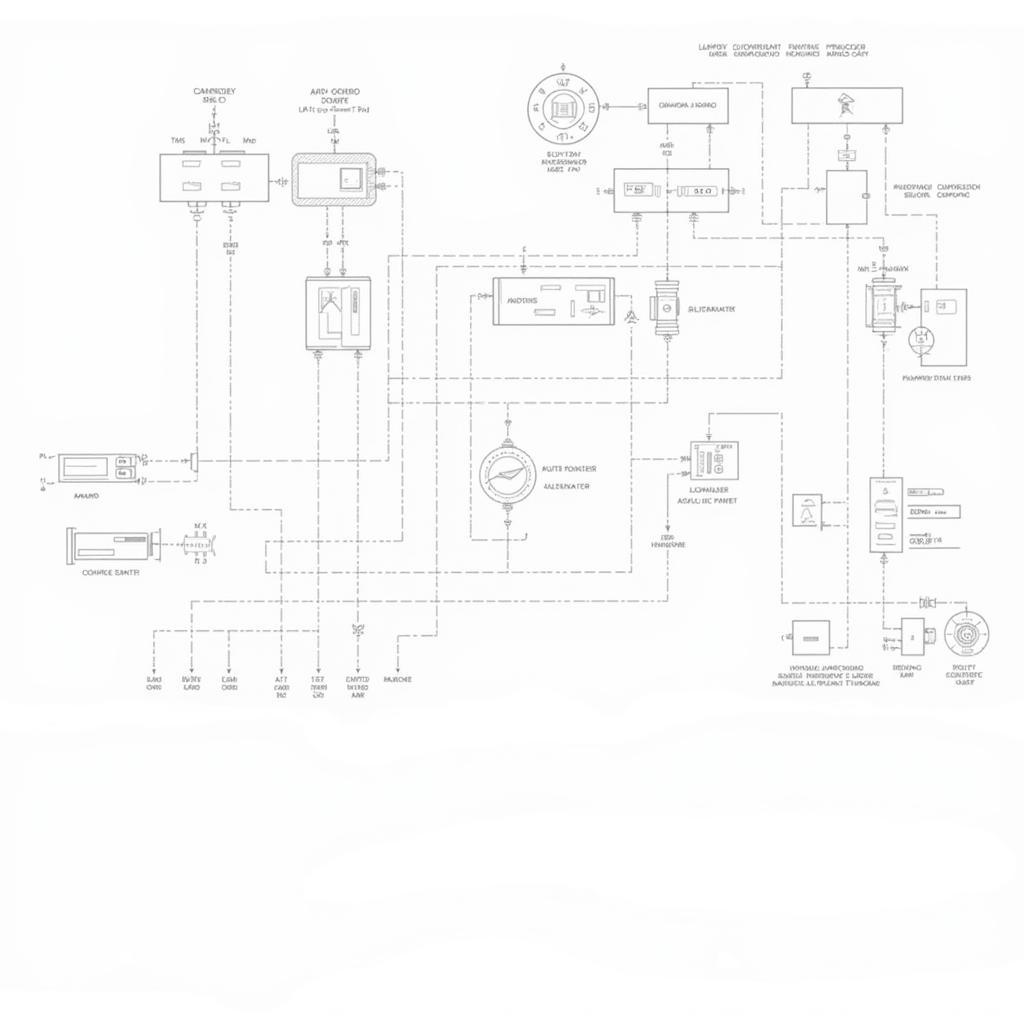Modern vehicles are intricate technological marvels, relying heavily on complex electrical systems for operation. When electrical gremlins strike, pinpointing the root cause can feel like navigating a labyrinth. That’s where car electrical diagnostics come into play, offering a systematic approach to troubleshooting and resolving those pesky electrical issues that plague even the most reliable vehicles.
The Importance of Car Electrical Diagnostics
Gone are the days of simple electrical systems with easily identifiable faults. Today’s cars are driven by an intricate network of sensors, actuators, and electronic control units (ECUs), all communicating through complex data networks. A single malfunctioning component can trigger a cascade of warning lights and baffling symptoms, leaving even experienced mechanics scratching their heads.
Car electrical diagnostics employ advanced tools and techniques to cut through the complexity and pinpoint the source of the problem with pinpoint accuracy. This not only saves time and money by avoiding unnecessary repairs but also ensures that the underlying issue is addressed effectively, preventing future headaches.
Common Symptoms Requiring Electrical Diagnostics
From flickering headlights to a complete engine shutdown, the symptoms of electrical problems can manifest in countless ways. Here are some common red flags that may indicate the need for professional car electrical diagnostics:
- Warning Lights: The illumination of warning lights on your dashboard, such as the check engine light, battery light, or ABS light, often signals an electrical fault.
- Starting Issues: Difficulty starting your car, clicking sounds when turning the key, or a complete failure to crank could point to a problem with the battery, starter, or related electrical components.
- Engine Performance Problems: Misfires, rough idling, reduced power, or unexpected stalling can all stem from faulty sensors, actuators, or wiring within the engine management system.
- Lighting Malfunctions: Dimming or flickering lights, non-functional headlights or taillights, or problems with interior lights often indicate issues with the battery, alternator, or wiring.
- Accessory Issues: Malfunctioning power windows, faulty door locks, erratic windshield wipers, or problems with the infotainment system can all be traced back to electrical problems.
How Car Electrical Diagnostics Work
Car electrical diagnostics leverage advanced tools and techniques to diagnose and troubleshoot electrical issues effectively. The process typically involves the following steps:
- Visual Inspection: A thorough visual inspection of the battery, wiring, fuses, and other visible components is conducted to identify any obvious signs of damage, corrosion, or loose connections.
- Diagnostic Trouble Codes (DTCs): Using a specialized car diagnostic scanner, technicians retrieve DTCs stored in the vehicle’s ECUs. These codes act as valuable clues, providing insights into the specific systems or components experiencing faults.
- Data Analysis: The retrieved DTCs are then analyzed in conjunction with the vehicle’s service history, manufacturer specifications, and the technician’s expertise to narrow down the potential causes of the problem.
- Component Testing: Based on the data analysis, specific components are tested using multimeters, oscilloscopes, and other specialized tools to verify their functionality and identify the root cause of the fault.
- Repair and Verification: Once the faulty component or wiring issue is identified, the necessary repairs are performed. After the repair, the diagnostic scanner is used again to clear the DTCs and ensure that the problem has been resolved effectively.
The Benefits of Professional Electrical Diagnostics
While some car owners may be tempted to tackle electrical issues themselves, the complexity of modern automotive electrical systems often necessitates the expertise of trained professionals. Here’s why:
- Accurate Diagnosis: Professional technicians have access to advanced diagnostic tools, extensive knowledge of vehicle electrical systems, and the experience to interpret DTCs and pinpoint the root cause of the problem accurately.
- Time and Cost Savings: By avoiding guesswork and unnecessary repairs, professional diagnostics can save you both time and money in the long run.
- Safe and Effective Repairs: Electrical systems operate at high voltages and currents, posing potential safety risks. Professional technicians are trained to handle these systems safely and perform repairs effectively.
- Warranty Coverage: In some cases, electrical repairs performed by certified technicians may be covered under the vehicle’s warranty, saving you from out-of-pocket expenses.
Choosing the Right Electrical Diagnostic Service
When faced with potential electrical issues in your vehicle, selecting a reputable and experienced car electrical diagnostic service is crucial. Here are some factors to consider:
- Experience and Expertise: Look for a service provider with a proven track record in car electrical diagnostics and a team of qualified technicians with specialized knowledge.
- Advanced Equipment: Ensure that the service provider uses state-of-the-art diagnostic tools and equipment to ensure accurate and efficient troubleshooting.
- Transparent Communication: Choose a service provider that prioritizes clear communication, explaining the diagnostic process, findings, and repair options in a language you can understand.
- Competitive Pricing: Obtain quotes from multiple service providers to compare pricing and ensure that you are getting a fair deal for the services offered.
Conclusion
Car electrical diagnostics play a vital role in keeping modern vehicles running smoothly. By employing advanced tools and techniques, skilled technicians can quickly and accurately identify and resolve even the most complex electrical issues, saving you time, money, and frustration. When faced with electrical gremlins in your car, don’t hesitate to seek the assistance of a reputable and experienced car electrical diagnostic service.
FAQs about Car Electrical Diagnostics
Q: How often should I get my car’s electrical system checked?
A: It’s generally recommended to have your car’s electrical system inspected annually or as part of your regular maintenance schedule.
Q: Can I perform car electrical diagnostics myself?
A: While basic checks are possible, the complexity of modern electrical systems makes it advisable to seek professional diagnostics for accurate and safe repairs.
Q: How much do car electrical diagnostics typically cost?
A: The cost can vary depending on the complexity of the issue and the service provider’s rates. However, it’s a worthwhile investment compared to the potential costs of misdiagnosis or improper repairs.
Q: What are some common car electrical diagnostic tools?
A: Common tools include car diagnostic scanners, multimeters, oscilloscopes, battery testers, and circuit testers.
Q: Can electrical problems damage other parts of my car?
A: Yes, unaddressed electrical faults can potentially lead to damage to other components, such as the battery, alternator, or even the engine control unit (ECU).
For all your car electrical diagnostic needs in Leicester, Grimsby, or Ormskirk, DiagFixPro offers reliable and professional services. Explore our range of car electrical diagnostics tools or delve deeper into the world of electrical diagnostics for cars. Contact us today for expert assistance and experience the DiagFixPro difference.


